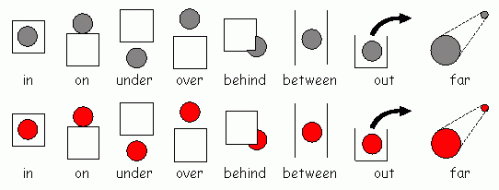ENGLISH ARTICLES: Definite, indefinite and zero article
Printable version here ; ‘Grammar reference on ‘The’ use and omission” here
Here you will find all – or nearly all – the uses of the different English articles. We also include specific notes on the use of articles with abstract and generic nouns.
1. The definite article “the” refers only to specific nouns.
It marks a noun phrase as definite that is, referring to something that can be identified uniquely in the contextual or general knowledge shared by speaker and hearer.
1. ‘The’ may refer to a noun mentioned earlier (so it becomes specific and definite): Fred bought a radio and a tv-set , he returned the radio.
2. ‘The’ may also refer to a noun specified by the following sentence: I’m trying to find the book that I wanted to show you.
Other uses to take into account are:
1. In connection to the immediate situation, present and visible: Can you see the bird sitting on the lower branch?
2. It may refer to a large situation; assumptions about general knowledge: In the dark we couldn’t see what the countryside looked like. I won’t come by car, I’ll take the train.
3. With reference to parts of the body, in prepositional phrases instead of the possessive. He grabbed me by the arm.
4. Logical and grammatical factors: nouns premodified by superlatives, ordinals and similar restrictive items will be made logically unique: He is the best guitarist of all times. I was the first to arrive. She was the sole survivor.
5. With musical instruments: Can he play the piano?
6. With national or ethnic groups: The Chinese are very hard working people.
7. With nouns deriving from adjectives with human reference: the blind, the unemployed, the poor, the rich (plural invariable)
2. The indefinite article is used when we refer to something that is not unique or identifiable to start with.
I’m going to move into an apartment quite near where you live.
It is associated with the first time we mention something. A subsequent mention would need the definite article “the”:
She lost a camera, a radio and a purse; though fortunately the purse contained very little money and the camera was insured.
3. The zero article (no article needed) is used in the following situations:
1. Definite meaning: similarly to “the”, specifying a unique referent: As (the) chairman, I must rule you out of order.
2. With plural countable and noncount nouns. Quantification would be expressed by ‘some’ or ‘any’: Coffee can be bought almost everywhere. Some coffee will wake you up. Roses are my favourite type of flower.
3. In idioms relating to:
| 1. Specific places | He must be in/go to school, town, bed, church, prison.Institutions are specific places, no need to use ‘the’. | |
| 2. with seasons | In spring we like to clean the house.We visit my parents for Christmas and at Easter. | |
| 3. with meals | Breakfast was delicious. He’s preparing dinner by himself. | |
| 4. with diseases | He’s dying of pneumonia. Appendicitis nearly killed him. (specially with technical medical names, except ‘the mumps’ and ‘the measles’ ‘) | |
| 5. with time expressions | By/at night/day. At midday/midnight/dawn. After dark/nightfall. Before dawn/dusk. | |
| 6. Transport and communication | We’ll go/travel/come by train/bus, car, plane, bicycle. ( but also: We’ll take the train.)Send it by telex, post, mail, satellite, fax. | |
| 7. Fixed phrases and complex prepositions | by heart, on foot, in case of , out of step. | |
| 8. Binominal expressions used adverbially | hand in hand, mile after mile, day in day out, eye to eye. | |
4. Article usage with abstract nouns
Abstract nouns can be treated as countable or uncountable nouns and go with or without articles.
As uncountable nouns – no article: when they refer to activities, states, qualities.
He is studying European history. Peace of mind helps people live longer. Injustice was widespread within the judicial system itself. Her body was racked with grief.
As countable nouns – article: when they refer to specific events:
The country has had a troubled history. The storm upset my peace of mind. He implored the judge to correct the injustice. It was a grief he had never felt before.
5. The English article in generic reference
We can refer to something countable in a generic way by using any of the three articles or by omitting the article altogether with plural nous (zero article):
The car / a car / cars became an increasing necessity of life in the 20th century.
Generic reference with uncountable nouns and plural is formed with the zero article.
Velvet is an excellent material for curtains. Children are an example of innocence.
NOTES:
- Zero is the most natural way of expressing the generic.
- The indefinite article tends to carry comparative meaning: Tigers run / a tiger runs more gracefully than most animals.
- “The” with singular nouns conveys a rather formal tone in generic use.

